
Xanthidae is a family of crabs known as gorilla crabs, mud crabs, pebble crabs or rubble crabs. Xanthid crabs are often brightly coloured and are highly poisonous, containing toxins which are not destroyed by cooking and for which no antidote is known. The toxins are similar to the tetrodotoxin and saxitoxin produced by puffer fish, and may be produced by bacteria in the genus Vibrio living in symbiosis with the crabs, mostly V. alginolyticus and V. parahaemolyticus.

Portunidae is a family of crabs which contains the swimming crabs.
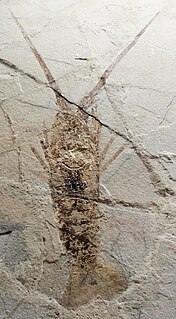
Justitia is a genus of spiny lobsters. Following the recognition of Nupalirus as a separate genus, Justitia comprises one extant species and two fossil species:
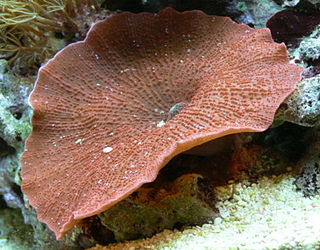
Corallimorpharia is an order of marine cnidarians closely related to stony or reef building corals (Scleractinia). They occur in both temperate and tropical climates, although they are mostly tropical. Temperate forms tend to be very robust, with wide and long columns, whereas tropical forms tend to have very short columns with a wide oral disc and very short tentacles. The tentacles are usually arranged in rows radiating from the mouth. Many species occur together in large groups, although there are recorded instances of individuals. In many respects, they resemble the stony corals, except for the absence of a stony skeleton. Morphological and molecular evidence suggests that they are very closely related to stony corals.
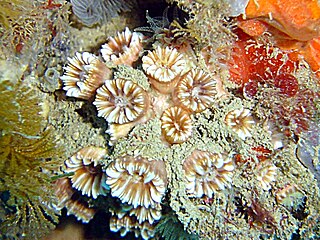
The Caryophylliidae are a family of stony corals found from the tropics to temperate seas, and from shallow to very deep water.

Acanthastrea is a genus of large polyp stony corals in the family Lobophylliidae. The colonies are massive and usually flat. The corallites are either circular or angular in shape. The septa are thick near the wall of the corallite, becoming thin near the columella, and have tall teeth. The polyps are extended only at night.
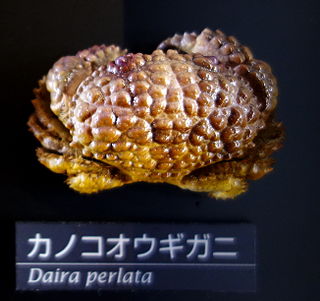
Dairoidea is a superfamily of crabs, comprising two families which each contain a single genus: Dairidae and Dacryopilumnidae (Dacryopilumnus) .
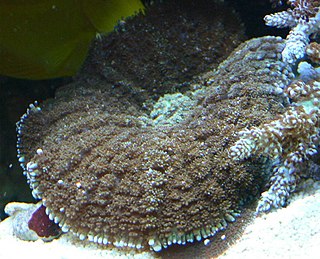
Rhodactis is genus of "mushroom corals", which are characterized by large individual polyps that are often reminiscent of a mushroom. Rhodactis are related to stony corals but do not produce a stony skeleton.

Cycloseris is a genus of solitary disc corals in the family Fungiidae. They are found in the Indo-Pacific. They inhabit the lower reef slopes, and the areas between reefs with soft sediments. They tolerate turbid waters.
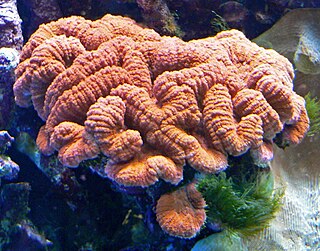
Lobophyllia, commonly called lobed brain coral or lobo coral, is a genus of large polyp stony corals. Members of this genus are sometimes found in reef aquariums.

Cyclograpsus is a genus of crabs, containing the following species:
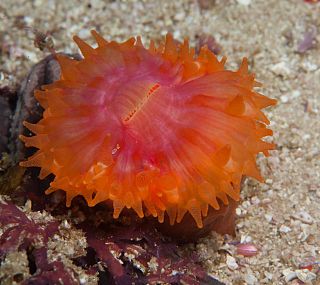
Caryophyllia is a genus of solitary corals in the family Caryophylliidae. Members of this genus are azooxanthellate and are found in the North Atlantic Ocean and the Mediterranean Sea at depths down to 2,670 metres (8,760 ft).

Meandrina is a genus of colonial stony coral in the family Meandrinidae. Corals in this genus form massive hemispherical heads or have large flat plates and can grow to a metre (yard) across. Sometimes it is referred to as.

Leptopsammia is a genus of stony cup corals in the family Dendrophylliidae. Members of this genus are found at depths down to about 900 metres (3,000 ft). They are azooxanthellate, meaning that they do not contain symbiotic photosynthetic algae as do many species of coral.

Dendrophyllia is a genus of stony cup corals in the family Dendrophylliidae. Members of this genus are found at depths down to about 900 metres (3,000 ft). They are azooxanthellate corals, meaning that they do not contain symbiotic photosynthetic dinoflagellates as do many species of coral.

Mycetophyllia is a genus of stony corals in the family Mussidae, commonly known as ridged cactus corals. Members of this genus are native to the Caribbean area. They are zooxanthellate species and are sometimes kept in reef aquaria.

Calappilia is an extinct genus of box crabs belonging to the family Calappidae. The type species of the genus is Calappilia verrucosa.

Pachycheles is a genus of porcelain crabs in the family Porcellanidae. There are more than 40 described species in Pachycheles.

Psammocora is a genus of stony coral in the monotypic family Psammocoridae. Species of this genus are also known as cat's paw coral.

Plesiastraea is a genus of corals. It is the only genus in the monotypic family Plesiastreidae.




















